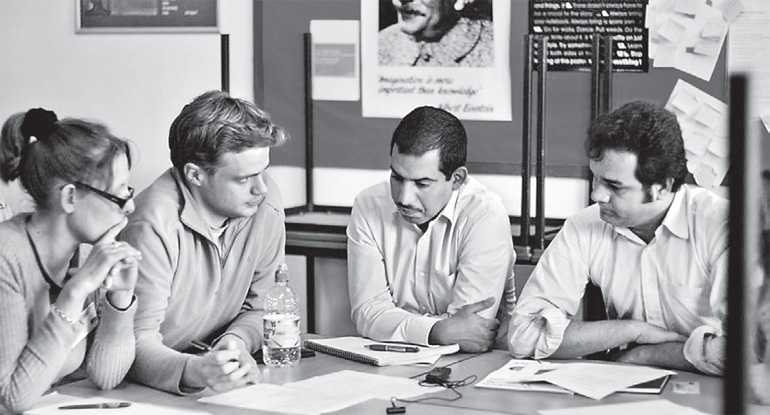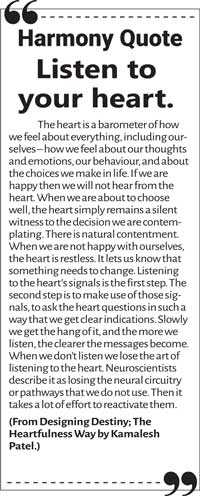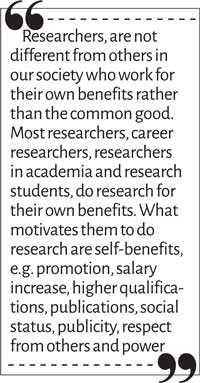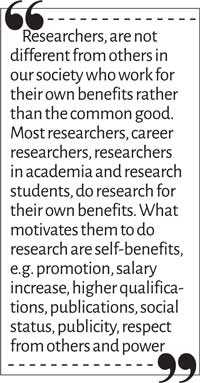Sunday Feb 22, 2026
Sunday Feb 22, 2026
Saturday, 14 March 2020 00:00 - - {{hitsCtrl.values.hits}}

Doing research for our own benefits prevents us from doing research really useful for our society and the environment. Our selfish motives guide us in each and every step of doing research, from identifying research problems, choosing research methods, data collection and analysis, making the conclusion to publishing the final paper
How does one relate to the word ‘Harmony’? It is a word that is used across spheres; to describe peace within oneself and one’s outer world, fellowship within communities and also to describe anything that is perfect in its alignment. We say perfect harmony of sound, when listening to an orchestra when all the musical instruments are being played in perfect synchronisation. We also admire paintings and we say the colours blend harmoniously on the canvass. All human beings are nothing but paintings in the making in this canvass of planet earth, where our lives are inter connected with fellow inhabitants – humans, plants and animals. Through this new page dedicated to Harmony in all its forms, compiled by Suryamithra Vishwa in coordination with the Daily FT/Weekend FT and the Earth Life Water Knowledge Trails Lanka initiative, we aspire to promote every kind of knowing that is educative, wise, compassionate and contemplative. The objective is to create a
harmonious reality. We wish you happy reading.
By Prof. Rohana Ulluwishewa,
Dr. Anura Kumara Uthumange
and Suryamithra Vishwa
How many of us; whether career researchers, academics or research students, look at research as a spiritual exercise, a holistic method, an act of deep love, to study a phenomena in this universe that affects humans, and to examine it, in order to bring about a change for the better?
How many of us use research with a keen sense of introspection; so that from the point we set the hypothesis we are looking at something with a deep pragmatism, compassion and empathy?
In this article we argue that research is a spiritual activity and we consider it unfortunate that it has today become a mechanical exercise which largely serves only a few who conduct research, fund research and profit-making organisations that employ researchers. Researchers have become ‘machines’ of research. How do we change this?
The path would be to take a deep and contemplative look at what research means for the human heart and mind – we have to then re-search our selves. Let us start with a few preliminary questions: Why are we doing a research? For whose benefits? As researchers, do we deeply care from our hearts for the problem that we are planning to examine? To delve further, let us ask; what is the alternative way of looking at research? 
Let us open our minds and examine the following points. Research is meant to generate knowledge necessary to solve problems our society is facing or in other words for the common good. Let’s try to understand the meaning of the common good.
We all are integral parts of a whole system, a system which constitutes both society and environment. Another way of saying this is to state that we are integral parts of the universe. This universe is a system which provides us with all our needs and wants. We belong to the system and the system is taking care of us. Hence, we should act for the well-being of the system in order to enable it to meet our needs and wants. If the system is taken care of, the system will make sure our needs and wants are met.
Working with the genuine intention of the well-being of the system means working for the common good, for the interests of all. It means working with deep love in one’s heart and eliminating, with effort, everything else that is not part of one’s higher inner self, at any point of the research. As researchers, we should think that “I am an integral part of the system – the universe. I belong to the system. Therefore, I should work for the well-being of the system – the universe so that the system can take care of me”. Here is an analogy for what we are trying to say: All cells which form our body are able to survive independently if they are separated. But when they are in the body as integral parts of the system, they continuously work for the well-being of the whole body. We, the system, work to earn and to feed the body which in turn feeds cells. This integral connection is how the entire universe operates as well as the world as we know it.
So, working for the common good means working for the benefits of all including ourselves. When we act for the common good, both ourselves and others benefit. It should be pertinent to mention that we should eliminate all our baser instincts that may arise in the process of doing the research such as ego, jealousy, pride about the superiority of our title, any prejudice we may have and may hide within our research. Whenever we do something for the common good, with genuine love in our heart, we feel happy. Research evidence proves that those who work for the common good are happier than those who work for their own benefits and they become healthier and live longer.
However, what we see in today’s society? In our materialistic society with a rote learning based education system, we can hardly find individuals who work for the common good. Most of us work with self-centred intentions. We work for our own benefits rather than for the common good. We think “I am an independent unit separated from the system. I am in the system because I want to gain benefits from it for my own good. I should make use of others in the society and the environment for my own good and for the good of 
my family.”
Whatever we do in our ordinary life, our hidden goal is self-benefits – material gain (money, material possessions), higher social status, power over others, reputation and respect, etc. Most of us believe that individuals must work for their own benefits or for the private good (not for the common good). Today, we can see the consequences of this in two forms:
(1) Social consequences and (2) environmental consequences. Selfishness is rampant in our society and the world. We see selfish leaders in our organisations, selfish professionals (doctors, engineers, professors and researchers) who use their knowledge and skills for private good, to accumulate money, rather than the common good. Our selfishness and how we have used our modern knowledge for destruction have brought upon ourselves environmental consequences: climate calamities such as drought and floods, pollution, deforestation, extinction of vital species to name a few manmade disasters.
Researchers, are not different from others in our society who work for their own benefits rather than the common good. Most researchers, career researchers, researchers in academia and research students, do research for their own benefits. What motivates them to do research are self-benefits, e.g. promotion, salary increase, higher qualifications, publications, social status, publicity, respect from others and power.
The theory of work orientation identifies three categories of employees according to their work orientation: (1) Job orientation, (2) Career orientation and (3) Calling orientation. While the first two categories work for their own benefits, the third category works for the common good. A study undertaken in the USA has revealed that majority of employees belong to the first two categories. Only a small minority works for the greater good. There is no evidence to believe that this pattern of distribution does not exist among researchers.
Like everyone else, researchers too perceive themselves, not as integral parts of the system, but as independent entities separated from the system. Where a researcher perceives himself/herself as ‘I’ and the society as ‘they/others’, ‘I’ (the researcher) identifies a problem of others his/her research. From the researcher’s perspective (even of the researcher does not admit it to himself or herself), ‘it is not my problem, it is their problem, I am not affected by their problem but I am doing my research for my benefits. It is highly questionable whether there is genuine, heartfelt interest within them to solve the problems they study. In sociology we study about Auguste Comte considered the first philosopher of science who came up with using the same science based analysis for understanding human conditions – but what most academics will not try to analyse is why he came up with the theories he did. Auguste Comte was a deeply humane man who died before he could fully complete his work on introducing the ‘Religion of Humanity’.
No real motive
This is where the real issue is. We are lacking in deep humanism when we undertake a research. Researchers just want to use the problems (of the society) for their own benefits. There is no real motive within them to do their best to solve the problem. Because if we really think; for the number of research done and researchers we have in this country; it should be a paradise – if the actual motive for those research was to solve the problem and change humanity for the better. 
Doing research for our own benefits prevents us from doing research really useful for our society and the environment. Our selfish motives guide us in each and every step of doing research, from identifying research problems, choosing research methods, data collection and analysis, making the conclusion to publishing the final paper. For instance;
n Instead of choosing real problems of the society/environment, we tend to choose problems that we can handle easily and finish quickly.
n We tend to choose the problems for which funding is available. It is a common fact that funding agencies determine what research we do.
n We want to publish as many papers as possible during a short span of time. This may lead to unethical research practices.
n Instead of choosing the best but time consuming methods for data collection, we tend to adopt quick methods that are not really appropriate.
n Manipulation of results for selfish gains is not uncommon among researchers.
The way research is currently done benefits researchers, for their career development, and maybe funding agencies, but does very little for the society. Furthermore, the research does not give lasting happiness to the researcher. Instead what is seen in many career researchers and academics pursuing research is that they accumulate a lot of stress. The researcher may achieve higher levels in his/her career, but will not be happier than before. Instead, the researcher will continue to suffer from work-related anxiety and depression.
Research for the common good: A new research paradigm
The new paradigm requires an inner transformation within researchers. Of course this transformation does not come overnight and one has to ‘re-search’ oneself constantly to check one’s inner mind and inner character evolution, which is a task by itself.
But with this inner transformation, the researcher begins to perceive himself/herself as an integral part of society and the research problem as his/her own problem. Only then, a genuine interest arises within the researcher to do his/her best to solve the problem. Then, the researcher does research for the benefits of the whole society. This calls for a shift in their work-orientation from career orientation to calling orientation. But as we said before we would like to reiterate that this requires them to do stringent inner work within themselves.
When researchers try to evolve spiritually and are motivated to do research by genuine interest in solving true problems of the society, irrespective of funding and do their best to find a true and sustainable solution for the problem they have chosen, the selfish interests of donors or funding agencies cannot influence them. Since they genuinely want to solve the problem, they become genuinely committed to the research project they undertake, whatever the material realities.
They do not seek short-cuts at the expense of the quality of the research, because increasing the number of publications and citations is not their main interest. Their genuine interest in the common good will then positively influence the inner character of their co-researchers, research assistants and others supporting staff too. They therefore become catalyst for a positive change in many others and make their best, probably by undertaking further research in different forms (participatory, action research, etc.) to apply their research findings to remove the problem from society.
Their genuine interest in doing research for the common good make them happy. As they progress in their career, they become happier. Their research will positively affect the society/environment
and enhance its happiness and well-being.
(This article is a continuation of a series on ‘Integrating Spirituality into Education’ that is run in the Harmony Page. The previous article was titled ‘Putting spirituality into practice: Changing Sri Lanka’s education paradigm’: http://www.ft.lk/harmony_page/Putting-spirituality-into-practice-Changing-Sri-Lanka-s-education-paradigm/10523-693804.)
(Rohana Ulluwishewa PhD is a Visiting Professor/Director (Education and External Relations), Center for Spirituality in Sustainable Business Management, Faculty of Management Studies and Commerce, University of Sri Jayewardenepura, Sri Lanka. In his 30 years of academic career he has worked as Associate Professor at University of Sri Jayewardenepura, as Senior Lecturer at the University of Brunei Darussalam, and was Visiting Fellow at Wageningen Agricultural University in the Netherlands, Leeds University in UK, Leiden University in the Netherlands and Massey University in New Zealand. For the last decade, the focus of his research and publications has been on spirituality and sustainability. While his first book on this subject; Spirituality and Sustainable Development (Palgrave Macmillan, UK) was honoured as a Finalist of the International Book Award 2014, the second book, Spirituality Demystified: Understanding Spirituality in Rational Terms won the AWCT award (the highest prize annually awarded in New Zealand for books on Body, Mind and Spirit in 2015.
Dr. Anura Kumara Uthumange is Dean of the Faculty of Management Studies and Commerce and Executive Director of the Centre for Spirituality in Sustainable Business Management at the University of Sri Jayewardenepura. His academic background ranges from economics to statistics and operational research and has enabled him to transcend across vistas of both social sciences and engineering. His research interests lie in the areas of Sustainable Development, Knowledge Economics, Operations Management and Spirituality.
Suryamithra Vishwa cultivates trees in the central province of Sri Lanka as well as elsewhere and has a keen interest in comparative spirituality and indigenous knowledge. She is currently studying the pre-colonial educational philosophy and methods of Sri Lanka and South Asia. Her academic training has been in sociology. She is a curriculum writer and visiting lecturer in Mass Communication at a national university in Sri Lanka under her inherited family name. Her library of 20,000 books, of which a large number is on Indigenous medicine, agro forestry, philosophy, global literature, science, comparative religions and secular spirituality has been opened up for the public free of charge. Those interested in borrowing any book could contact 0812494285.)